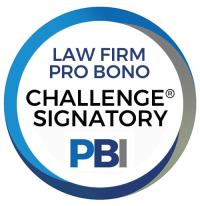Pro Bono

From senior partners to new associates, Saul Ewing encourages every lawyer in the firm to provide pro bono publico service to individuals and nonprofits who cannot otherwise afford legal representation in our communities. We are a proud participant in the Pro Bono Institute’s Law Firm Pro Bono Challenge, a unique benchmark for pro bono service among large law firms. Our Pro Bono Committee works with community partners to provide a range of pro bono opportunities and related training programs to all attorneys.
We provide pro bono legal services across many areas, such as:
- Civil rights
- Election laws
- Constitutional challenges including first and second amendment cases
- Immigration/asylum
- Housing security
- Labor and employment
- LGBTQ+ law and rights
- Nonprofit corporate governance and real estate
- Programs for unrepresented children
- Women’s law and reproductive health
We identify pro bono opportunities through our work with these and many other organizations:
- ACLU of Minneapolis
- Americans for Immigrant Justice (Florida)
- Chesapeake Legal Alliance
- Chicago Lawyers’ Committee for Civil Rights
- District of New Jersey’s ReNew Reentry Program
- Family Court of Delaware
- Fuel Fund of Maryland
- Habitat for Humanity of the Chesapeake
- Hebrew Immigrant Aid Society
- Hope Coalition (Minnesota)
- Lawndale Christian Legal Center (Chicago)
- Lawyers for the Creative Arts (Chicago)
- Legal Services of New Jersey
- LGBT Rights Committee of the Philadelphia Bar Association
- Maryland Volunteer Lawyers Service
- Ministry of Caring (Delaware)
- Misericordia (Chicago)
- Pennsylvania Innocence Project
- Philadelphia VIP
- Surgeons of Hope Foundation (New York)
Saul Ewing attorneys advised on these select pro bono matters:
- The Colin Farrell Foundation, which provides support for individuals and families living with intellectual disabilities through education, awareness, advocacy, and innovative programs, in assisting with the establishment of the foundation and forming the corporate entity. The organization was inspired by actor Colin Farrell's personal experiences and his deep commitment to making a positive impact.
- A nonprofit organization in successfully urging the Pennsylvania Supreme Court in an amicus brief to overturn long-standing precedent that permitted the broad use of “common law” civil asset forfeiture. The Court held that common law civil asset forfeiture is no longer permitted, and that civil asset forfeiture must be authorized by statute. The majority directly cited the firm’s amicus brief in its opinion.
- A Zambian national who was brought to the United States as a live-in nanny but was never paid during her nearly 10 months of employment. Our team brought suit under the Fair Labor Standards Act and state laws, and after a two-day bench trial, the judge awarded our client nearly $30,000. Following this award, the district court denied the county’s motion for judgement notwithstanding the verdict (JNOV) and awarded our client $248,000 in legal fees as the prevailing party under section 1983.
- A nonprofit organization in an internal investigation stemming from an employee’s allegations of misconduct in the performance of a government contract. After interviewing employees and analyzing records, our team drafted a report for the nonprofit’s board, assisted with a corrective action plan, and provided compliance training for executives and board members.
- An individual in obtaining a clean title to her home of the past 50 years through investigation of heirs of the client’s prior boyfriend (in whose name the property was deeded) and quiet title litigation.
- A nonprofit organization in assisting it with a lease for a new home improvement and donation center that sells new and gently used home goods, building materials, and other supplies.
- An individual in the granting of a legal change of name by a Philadelphia judge following our participation in a legal aid clinic hosted by the LGBT Rights Committee of the Philadelphia Bar Association.
- A nonprofit organization in obtaining variances from zoning regulations allowing for the construction of a new single-family home for a family in need.
- An incarcerated individual in securing a favorable settlement of claims of discrimination on the basis of race and religion in violation of Section 1983 of the Civil Rights Act.
- An educational nonprofit organization under financial strain in negotiating the termination of its lease without any financial recourse and in the successful negotiation of a new lease at a different property with provisions for several months of free rent.
- An individual in an insurance subrogation matter stemming from a hit-and-run accident where the car that fled the scene was identified as belonging to our client. We convinced opposing counsel that our client had sold the car for cash prior to the hit-and-run and to dismiss him from the case.
- An activist who was cited for failing to obtain a permit before holding a peaceful march. After our team prepared various First Amendment defenses, the borough dropped the citation and dismissed the case.
- A nonprofit organization in an appeal to the Pennsylvania Office of Open Records of a Pennsylvania county’s denial of a right-to-know request seeking public records related to an audit of voting machines.
Contact
Mary Beth Schluckebier McGovern
Pro Bono Counsel
MaryBeth.Schluckebier@Saul.com
